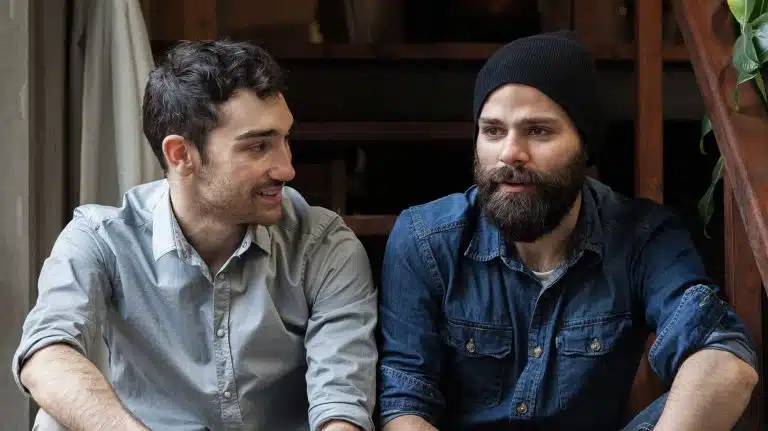A 12-Step Sponsorship Guide For Sponsors & Sponsees
- What Is A Sponsor?
- How To Be A Good Sponsor
- What Is A Sponsee?
- How To Find A Sponsor
- The Sponsor-Sponsee Relationship

Twelve-step programs like Alcoholics Anonymous (AA) and Narcotics Anonymous (NA) have helped countless people recover from addiction.
These programs foster connection and support among all members. Some members also receive individualized support through twelve-step sponsorships.
What Is A Sponsor In A 12-Step Program?
A sponsor is a member of a 12-step program who helps another member achieve and maintain a sober life. Most sponsor-sponsee relationships include regular phone calls, in-person meetings, and other forms of contact.
Sponsors must have a solid grasp of the 12-step recovery process. Most of them have worked through all 12 steps, and many have achieved at least one year of sobriety.
However, you don’t have to undergo any screening or training to become a sponsor. You just need a commitment to sobriety and a desire to help others.
What Does A Sponsor Do?
A sponsor guides a sponsee through the program’s 12 steps.
While working the steps, the sponsee may face a number of challenges, such as procrastination, low self-esteem, or even relapse. The sponsor uses their knowledge and experience to help the sponsee overcome these challenges.
In general, 12-step programs lack formal rules regarding sponsorships. Instead, they let the sponsors themselves choose how to best support sponsees.
Most sponsors offer support by:
- sharing their own recovery experiences
- encouraging the sponsee to attend 12-step meetings and other recovery-focused events
- introducing the sponsee to other 12-step group members
- elaborating on topics discussed at meetings
- helping the sponsee manage triggering situations, such as parties or weddings
- providing recovery-focused workbooks and worksheets
- answering any questions the sponsee has
Sponsors also support sponsees by providing a personal connection. Although it may seem simple, many people crave this type of connection when they first enter recovery. That’s because addiction can destroy personal relationships, leaving a person lonely and connectionless.
How To Be A Good Sponsor
As mentioned above, every sponsor needs a thorough understanding of the 12-step recovery process.
The Big Book
To deepen your understanding, regularly attend group meetings, and read the Big Book. This text details the Alcoholics Anonymous program, but it’s relevant to other 12-step programs as well. You should also encourage your sponsee to read it.
Listening Skills
In addition, a good sponsor has excellent listening skills.
You’ll need to pay close attention to your sponsee’s thoughts and feelings without forcing your personal views.
For example, while you should discuss your views on recovery, avoid oversharing your spiritual principles (such as your concept of a “higher power”). Instead, learn about your sponsee’s spiritual experiences (or lack therefore) so you can better guide them on their recovery journey.
Time
Finally, make sure you have enough time to support your sponsee.
Some sponsees need to talk a couple of times a week, while others need to talk every day. Ask your sponsee how much of your time they think they’ll need, and be honest about your availability.
While you should meet up or take calls when possible, you must also focus on your own life and recovery.
What Is A Sponsee?
A sponsee is a person who receives guidance from a sponsor. Most sponsees are attempting 12-step recovery for the first time. However, even old-timers may seek sponsorships to sharpen their recovery skills.
How To Find A Sponsor
You can ask anyone in your 12-step group to be your sponsor. When deciding who to ask, consider these factors:
Stability
Your sponsor should model a stable, sober life. In other words, they should be much further along in their recovery than you. They should also have a passion for sponsorship.
Availability
Some sponsors have more than one sponsee. If your prospective sponsor already has a lot of sponsees, they may not have enough time to properly support you.
Gender
Like other relationships, a sponsorship relationship gets complicated if one or both people develop romantic or sexual feelings.
Thus, if you’re attracted to a certain gender, you may want to avoid sponsors of that gender. For instance, a gay woman should probably choose a male sponsor.
Trust
You should trust that your sponsor won’t judge you if you experience a relapse or other challenge.
Instead, they should answer questions openly and guide you back on the road to recovery. If you don’t feel totally comfortable opening up to your prospective sponsor, choose a different one.
The Sponsor-Sponsee Relationship
A healthy, trusting sponsor-sponsee relationship benefits not only the sponsee but also the sponsor. That’s because sponsorship provides a sense of purpose that can further motivate the sponsor to maintain recovery.
To learn more about 12-step programs and other addiction treatment options, please contact an Ark Behavioral Health specialist. Our treatment centers offer various forms of evidence-based care, including support groups, mental health counseling, and medical detox.
Written by Ark Behavioral Health Editorial Team
©2024 Ark National Holdings, LLC. | All Rights Reserved.
This page does not provide medical advice.
Alcoholics Anonymous - P-15 Questions & Answers on Sponsorship
National Institute on Drug Abuse - 12-Step Facilitation Therapy (Alcohol, Stimulants, Opiates)
Substance Abuse and Mental Health Services Administration - Pathways to Healing and Recovery: Perspectives from Individuals with Histories of Alcohol and Other Drug Problems
United States National Library of Medicine - The effects of sponsorship in 12-step treatment of injection drug user

Questions About Treatment?
Ark Behavioral Health offers 100% confidential substance abuse assessment and treatment placement tailored to your individual needs. Achieve long-term recovery.
100% confidential. We respect your privacy.
Prefer Texting?
Our friendly support team is here to chat 24/7. Opt out any time.







 Learn More
Learn More








